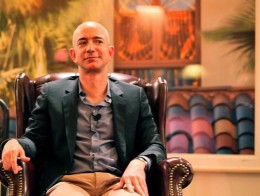Amazon’s Movement from “Missionary” to “Mercenary”

Ah, the customer — that delicious, discerning, weak-willed figure! For Bezos, the customer is everything: a comrade, a dependent, and a kind of theological entity, on whose altar almost any sacrifice is reasonable. If you can deliver the lowest prices and widest selection and speediest shipping, won’t your customer forgive just about anything? Speaking as one (and how), I can say that the answer is no. If the choice is between paying an extra two dollars for a paperback and putting an entire industry to the torch, I’m willing to ante up.
Perhaps Bezos is mulling over at least a few of these matters. At some point over the past couple of years, he drew up a memo called “Amazon.love,” which laid out “a vision for how the Amazon founder wants his company to conduct itself and be perceived by the world.” Stone reprints one section, in which Bezos has listed a series of aphorisms — all of them hinging on what is “cool,” a word he may well have used, all those years ago, to describe his infinity cube.
Defeating tiny guys is not cool.
Winning is cool.
Defeating bigger, unsympathetic guys is cool.
Obsessing over competitors is not cool.
Conquerors are not cool.
Leadership is cool.
Hypocrisy is not cool.
Missionaries are cool.
At Harper’s, James Marcus reviews Brad Stone’s The Everything Store, a book about online retail giant Amazon and its founder, Jeff Bezos. Marcus’s review focuses on Amazon’s slow and steady move away from its “missionary” values to what now appears to be “mercenary” — once upon a time Amazon.com was the little guy battling big, profitable brick and mortar stores like Barnes and Noble, and it’s now siphoning revenue from book publishers big and small, avoiding tax payments in foreign countries by using loopholes, and spending more than $100 million to price-cut competitors and then acquire them (see: Zappos).
Marcus takes the position that Amazon’s low-prices doesn’t make up for some of these “mercenary” tactics, and that he’d rather spend a few extra dollars to avoid buying items from Amazon (Meaghan has taken a similar position by living in an “Amazon-free household”). I have to admit that my household (me), hasn’t gone Amazon-free — I ordered a gift for a friend on there just last week — but I’ve attempted to strike a balance with my purchases by buying books directly from publishers or authors whenever possible.
Photo: Steve Jurvetson
Support The Billfold
The Billfold continues to exist thanks to support from our readers. Help us continue to do our work by making a monthly pledge on Patreon or a one-time-only contribution through PayPal.
Comments